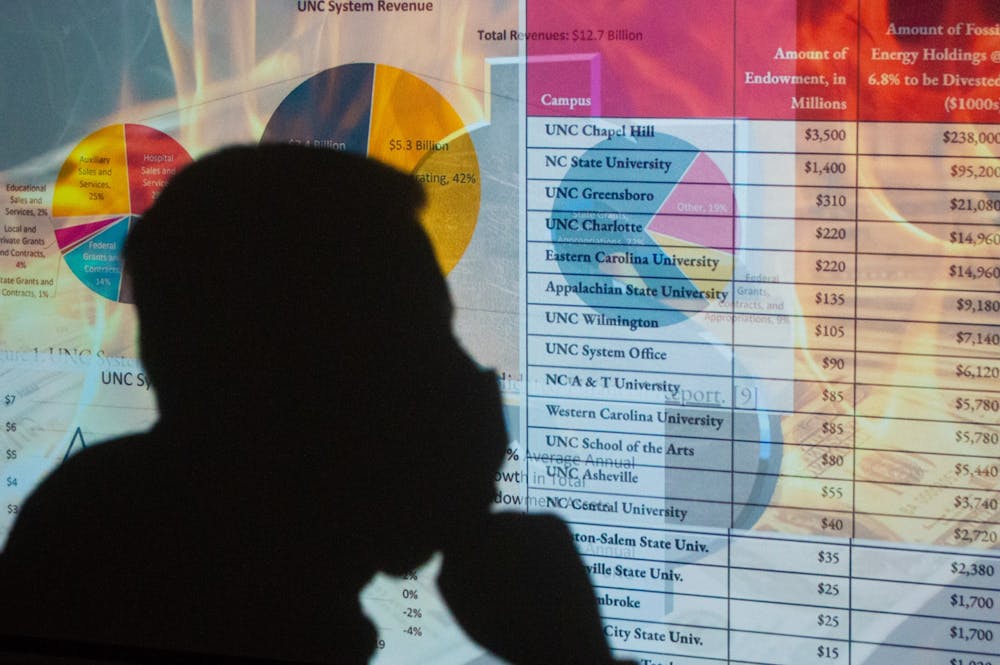Instead of austerity measures, Another UNC is Possible outlines four alternative actions that could be taken to alleviate financial deficits.
- Roll back the 2013 tax changes
- Withdraw funds from the state’s Rainy Day Fund
- Divest from fossil fuels
- Withdraw additional funds from campus endowments
“The main takeaway from this work is to challenge that normalization of austerity and try to envision something different from what we already have, which is a lot,” Gutierrez said.
Spokespersons for the UNC System did not respond to requests for comment.
Roll back tax changes
Jay Smith, a history professor who helped research and write the campaign, said the state legislature’s decisions over the past decade have exacerbated universities’ current financial strains brought on by COVID-19.
Nonini agreed and said the General Assembly’s 2013 tax changes were a “major blow” to higher education budgets. The changes involved cutting the corporate income tax rate and reducing the income tax rate for the highest earners. Since the changes went into effect the state has lost $12 billion and the Board of Governors has imposed $680 million in budget cuts on UNC System campuses.
Nonini said the reduced budget transformed the business model of higher education to increasingly rely on revenue from student tuition and auxiliary units like housing, dining, parking and athletics.
“Our resources have already been cut to the bone, we've already slashed programs and the faculty salaries haven't been raised appreciably in a decade or more,” Smith said. “And after roughly a decade of that kind of rough handling by the state legislature, it just seemed that responding to the COVID crisis with more budget cuts was going to be counterproductive — even suicidal.”
Smith and Nonini both voiced concern that further cuts and reductions could jeopardize the future of the UNC System and undermine universities’ abilities to fulfill their missions by making campuses less desirable for new recruits and students.
Another UNC is Possible calls for the General Assembly to rescind the 2013 regressive tax changes and appropriate one-third of the new state revenues — no less than $700 million — to the UNC System to support its infrastructure and workforce.
Withdraw funds from campus endowments, divest from fossil fuels and use the Rainy Day Fund
To get the day's news and headlines in your inbox each morning, sign up for our email newsletters.
Another recommended action is to withdraw funds from campus endowments. The UNC System’s consolidated endowments — the UNC Investment Fund — totaled more than $7.2 billion as of September 2020. The plan urges the UNC Board of Governors and the endowments' managers to divest from its fossil fuel holdings totaling over $439 million and either reinvest the proceeds in green energy or use the proceeds as bridge financing between the current period of financial shortfalls and a post-pandemic state.
Nate Knuffman, UNC’s interim vice chancellor for finance and operations, said in a statement that the majority of funds that make up the UNC Investment Fund have individual restrictions on how they can be used. He said funds can only be legally used for the purpose expressed by the donor at the time of donation.
UNC-Chapel Hill’s $3.9 billion-endowment is the largest in the UNC System. Based on the coalition’s calculations, if UNC-CH withdrew $507 million from its endowment in 2021 to address budget shortfalls, it would recover those funds completely in two to three years, assuming a 7 percent rate of return.
But Knuffman said that less than 10 percent of UNC’s endowment — approximately $6 million annually — is made up of unrestricted funds that could be used to help offset budget shortfalls. And most of the unrestricted funds are used for scholarships, fellowships, advising and Carolina Scholar programs, Knuffman said.
Smith said he rejects the notion of endowments being untouchable, especially during crises. Other schools such as Northwestern University and the University of Delaware have tapped into their endowments to finance budget shortfalls.
“When present circumstances threaten to destroy the foundation on which any reasonable future can be built, I think it is a good idea — a smart thing — to tap into resources that have been earmarked for future use for the present so that we can sustain ourselves through this emergency and get to a point where we will have a viable and bright future," Smith said. "Otherwise, we might not."
The last action outlined is to allocate $150 million from the state’s $1.2 billion Rainy Day Fund to UNC System campuses to meet their emergency financial needs.
Seeking solutions
If cuts are still deemed necessary by the UNC System and university administrations to mitigate budget deficits, the campaign demands that cuts start and end at the top.
The University is not currently planning to furlough, but Knuffman said it has limited spending, restricted hiring and postponed capital projects to address budget deficits. He also said Finance and Operations now reviews all expenditures over $5,000. Since beginning these spending restrictions last April, the University has saved approximately $70 million, Knuffman said.
This cross-campus effort to rethink how universities should respond to the financial losses they are facing began last summer, after the coalition was alarmed to hear UNC Board of Governors chairperson Randy Ramsey ask chancellors to submit plans for budget cuts of up to 50 percent.
The Another UNC is Possible campaign has been endorsed by UE Local 150 and the American Association of University Professors’ chapters at UNC-Chapel Hill and N.C. State.
"We have a climate crisis, we have a COVID crisis and we have an economic crisis in this country and in this state," Nonini said. "And we have to think carefully about solving all three of them together."
university@dailytarheel.com




